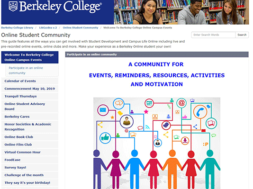
Effective Distance Learning Instructional Methods that Enhanced the FNU Student Experience During COVID-19
By Mireidy Fernandez, PsyD, Faculty, Florida National University, and Dr. Jose A. Perez, Psychology Program Director, Florida National University
Undoubtedly for all colleges and universities, the COVID-19 pandemic forced the hand of thousands of institutions to rapidly adjust their on-campus and face-to-face student learning experience into hybrid educational synergies. For Florida National University (FNU), the transition to fully online and remote learning classes – although challenging at first – became conspicuous amid so many unknowns in 2020 and through our current term in 2021. Going to remote learning or full-fledged distance learning had an impact on students around the world, according to the Lumina Foundation, a nonprofit that works to assist students in their transition from high school to college in students’ quest for higher education. Professors from Heinz University, for example, have spent years reviewing and studying the impact of technology.
In the education sector, COVID-19 sped up the technological reliance as a move toward digitization and customization in education have facilitated the swift adoption of meeting platforms and online educational learning models.
According to Eric Smith, a professor of Information Technology at Heinz, “there’s this assumption that the best way people learn is by sitting quietly in a class for 80 minutes at a time and then regurgitating facts every four weeks on exams. In fact, that’s not how most people learn.”1
One of the first successful organizational steps that FNU endeavored upon was to create a COVID-19 Emergency Task Force Committee consisting of one representative from each department, to create a plan of action and avoid any interruptions with the continuum of the course delivery experience. One of the key leaders to embark on this task was Dr. Emry Somnarain, FNU Director of Online Education, who shared his insight into how FNU swiftly and successfully moved into the virtual environment. To effectively integrate all aspects of the online course delivery experience for FNU students, Dr. Somnarain shared that the COVID-19 committee “successfully imagined education from our students’ perspective and contingencies were made for all departments to support the Florida National University student population. Student Services, Bursar’s, Financial Aid, and even access to FNU’s Deans were moved into a virtual format, in addition to adjusting the delivery of courses.” Planning for the most unplanned event of this generation was difficult but also opened an opportunity for many institutions to adapt and develop “high-quality, student-centered online programs that are now standard,” according to Paul LeBlanc, president of Southern New Hampshire University.2 Mr. LeBlanc said the business model task of going completely online involves “many moving parts” and must be done quickly.3
Notwithstanding, it took a pandemic to get universities across the globe to move into a more modern-era adoption of digital instructional methods, according to Harvard Business Review (HBR). Traditionally speaking, “higher education has lagged behind other industries in moving to a more digitally-driven, outcomes-focused business model.”4 According to HBR, the U.S. Department of Education data shows that while one-third of all U.S. college students had some type of online class familiarization prior to COVID-19, the other two-thirds were still only exposed to the face-to-face instructional format in brick and mortar campuses.5. In essence, the pandemic forced the hand of many educational institutions that had previously been less proactive at moving toward a more digital format. Even elite educational institutions such as Princeton University and Spelman College, changed their business models through tuition discounts while offering online courses – something that many in the industry considered extraordinary.6 FNU’s Dr. Somnarain concurs wholeheartedly with the new approach to digital learning in the wake of the pandemic: “Distance education has existed for decades, and the pandemic has taught us that this is the way of the future and gives every potential student a chance to earn a degree that is equivalent to any ground or traditional education. Every educator, in every country around the world, has had to recognize the benefit of providing an additional way to teach students.”
According to the World Economic Forum, prior to the COVID9-19 pandemic, there had already been an upsurge in the adoption of education technology globally in the form of virtual tutoring, video conferencing, and online learning software (such as Blackboard and Moodle).7 The rapid acceleration into the virtual classroom, albeit forced, has already seen successful models around the world.
One of these examples is Zhejiang University, which went live with more than 5,000 online courses within a two-week period using DingTalk ZJU.8
Zhejiang University along with Alibaba Group developed the DingTalk educational software in an attempt to reach educators and students and offer “efficient methods for online teaching” in courses such as chemistry.9 Other institutions such as Imperial College London offered courses specifically geared toward the science of coronavirus through Coursera, a learning management software also utilized by institutions such as Stanford University, Duke University, and the University of Illinois at Urbana-Champagne, among others.10 Another example is India, which traditionally based its educational methods on face-to-face lectures. The pandemic thwarted those institutional beliefs and compelled universities and colleges in India to “shift to an online mode of teaching overnight.”11 According to the Journal of Educational Technology Systems, due to the pandemic “many academic institutions that were earlier reluctant to change their traditional pedagogical approach had no option but to shift entirely to online teaching-learning.”12 In other countries, such as Morocco, nearly 10 million students were out of school by mid-March 2020; Morocco joined more than 100 countries to engage in school and university closures, thereby forcing an estimated 90% of the world’s student population into the online learning format.13 As a result of the pandemic, Educational Research International found that many countries “introduced various solutions … to continue education progression; online libraries support, TV broadcasts, guidelines, resources, video lectures, and online channels were introduced in at least 96 countries.”14 According to Washington Okeyo of the Daily Nation, in terms of the educational gamut as a whole, it is estimated the pandemic has impacted the learning of more than 1.7 billion learners worldwide, with the education sector being adversely affected by the “decline of economic activities due to cessation of movement, unemployment, closure of institutions” and other variables.15
At FNU, the COVID-19 committee and leadership took early steps to align the needs of the students and faculty and meet the challenges of the pandemic. Dr. Somnarain explained: “Training for faculty took place in early March 2020 and expectations were set for the synchronous courses that would be delivered; tutoring, office hours, recorded chats, publishers, and scaffolding materials were all recommended to faculty to ensure the successful transition to virtual education. As a team of educators, it was important to recall previous days as a student and recreate the potential pitfalls and obstacles our students might face.”
For the FNU leadership, faculty, and staff it became clear that it was important to support the students – especially during such an overseen event in a lifetime as a pandemic.
According to Dr. Somnarain, “From an online perspective, the circumstances led to a refreshing reminder to all … it would be more difficult for our students during a pandemic, and it is our duty to make the transition as stress-free as possible, with minimal interruption to the delivery of knowledge, information and content to our academics.” Once the FNU leadership determined that due to COVID-19, the course delivery would be either fully online or remote learning, the online education section transitioned the university into the more modern learning management system of Blackboard Ultra, for which training was offered in four separate sessions during April 2020 – with a full launch of the online teaching program in May 2020. Dr. Somnarain noted FNU’s commitment to securing and enhancing the student learning experience – at a high level – in the students’ quest for a valuable education. “Along with the transition to a cloud-based LMS, Florida National University also invested in a mobile app for both iOS and Android devices,” Dr. Somnarain said. “This provided an additional avenue for the students to access courses, alerts, and e-mails from the convenience of a cell phone. This is especially helpful for the portion of our student population that had internet accessibility issues or computer/laptop problems.”
Through his online education expertise, FNU’s Dr. Somnarain said he considers the following as the top three priorities in the online learning instructional format:
- Student success in achieving their educational goals;
- Providing professional, knowledgeable graduates that contribute to the community and their field of study; and
- Providing student support that commensurates with the problems they are facing, especially true during the COVID-19 pandemic.
It took an immense institutional effort to move toward fully online education as quickly and efficiently as Florida National University was able to do. FNU has continually strived toward the successful academic achievement of its students. Taking this into consideration, early planning and keeping students and faculty in mind, FNU moved from brick-and-mortar classes to distance learning without many setbacks, if any, at the beginning of the COVID 19 pandemic. The Psychology Division at FNU, with more than 300 students, and Bachelor’s and Master’s degree programs, experienced a speedy adjustment, which maintained the academic flow of its members, students, and supportive personnel. All faculty members within the Psychology Division had already been trained to teach online courses using the Blackboard platform. It is fair to say that this Division had an advantage over some other programs.
At FNU, its online learning division had commenced undergoing changes prior to the pandemic; The university had adopted Blackboard Ultra as the preferred platform to use for its online courses. That being said, FNU was not just facing a pandemic ahead, but also making changes in its technological platforms and resources. Most faculty members experienced new technological challenges that brought the academic community closer together in working for one common goal – maintaining service to its students and keep them up and running.
Students experienced a different facet of FNU that had been going unnoticed for years past. This aspect of professionalism gave students a new perspective and understanding of the world of academia at FNU. Students developed a new appreciation and admiration for their instructors; instructors developed a new bond with their students, and the administration perceived a new commitment by its faculty and staff. Interestingly enough, the Psychology Division faced post-pandemic changes through assessment and modification of its instructional plan. The inclusion of hybrid courses and the need for access to the classroom outside normal hours became noticeable. This access to faculty and staff has become the norm since the pandemic’s onset and part of the daily routine of FNU’s personnel. The intention to support students in their academic needs has always been a priority for the Psychology Division at FNU. Being able to do this at different hours of the day and within interchangeable schedules represented a positive outcome to the many changes experienced in a post-COVID-19 pandemic world.
According to Kasia Kovacs of Bestcolleges.com, low-income students as well as minority group students, have applied less for financial aid and dropped in greater numbers from colleges and universities across the United States.16
FNU continues to work diligently to change this situation by providing students with education as well as advising and guiding, mostly Hispanic students, in the advantages of early registration, understanding the advantages of online and hybrid courses and making them an important part of the decision making process. At Florida National University and the Psychology Division, academia continues to be the utmost priority, delivering superior services to students, helping them achieve established goals even under the stresses and challenges brought about by the COVID-19 pandemic.
Measuring success
Some research studies suggest that students perform much better in online learning than in traditional learning.17 An April 2021 scholarly article from Education and Information Technologies cites four major tenets pertaining to the varying degrees of success with regard to online teaching: course design, quality of the instructor, prompt feedback, and students’ expectations.18 According to the authors in the aforementioned study, “effective course design will help in improving the performance through learners knowledge and skills … however, if the course is not designed effectively then it might lead to low usage of e-learning platforms by the teachers and students.”19 Another study from the Faculty of Dentistry Universitas Indonesia revealed remarkable results pertaining to the majority of 301 surveyed students who participated in this research. Students were asked about their preferred learning methods: online compared to classroom learning. The survey results indicated that a higher number of first-year students preferred distance learning compared to students who were already in programs, and showed that 87.9% of students preferred distance learning because it gave them more time to study and review materials.20 The study also noted challenges with distance learning such as unstable internet connection, extra financial burden for online internet access, and time management difficulties when it comes to focusing on a subject matter for lengthy periods.21
So how is FNU measuring its success regarding the current online learning experience? FNU is relying on various quantitative methods of analysis to track the students’ progress, attendance, engagement, and risk factors, according to Dr. Somnarain. FNU changed ground course delivery to synchronous lectures through the Blackboard Ultra and Collaborate chat software. Those business models have worked efficiently, thus leading to FNU adopting the hybrid shells to enhance courses once students and faculty resume to on-campus, traditional live sessions. One of the various tools the FNU online learning team utilizes to determine if a student is at risk of failing a respective course is the attendance tracking feature, which tracked students’ log-in activities at least once weekly. Dr. Somnarain explained: “Once the students superseded a seven-day period of not logging in, they were identified as ‘At-Risk.’ Faculty, advisors, as well as LMS support specialists contacted students via email, phone, or text to provide support and assistance. This method of outreach assisted in keeping the student population at a steady rate, allowing the institution to avoid the drop in the total population that many other colleges and universities experienced during the pandemic.” Additionally, with the help of student surveys, FNU leadership was able to capture the results of the overall student experience. Such surveys revealed that 79% of ground-based students actually preferred the synchronous level of teaching through Blackboard Ultra, (as of September of 2020), even though the LMS had transitioned just one term (eight weeks) prior, according to Dr. Somnarain. The surveys also revealed that those students who preferred traditional delivery teaching methods were mostly from clinical-based programs, which do require in-person training. Dr. Somnarain added: “The follow-up surveys in the Fall of 2020 showed the same trend, as students prefer learning from the comfort of their home to ensure safety during the pandemic.”
Lessons learned
The pandemic has obliged university leaders, staff, and faculty to learn about the students’ needs and implement effective, solution-focused business models for online and hybrid education. Thus, it remains in the educators’ best interests to be abreast of the latest and the most modern instructional methods in the market. The ultimate goal, according to FNU’s Dr. Somnarain, is that “the benefit ultimately will lead to students who are knowledgeable and informed; without students to teach, educators would cease to exist; it behooves us to provide the best education to those who are willing to learn, pursue a career, and cross the stage at graduation.”
University leaders across the country cite the pandemic as a reference point for faculty and senior leadership to reframe the mindset of “a false dichotomy by pitting online vs. in-person classes,” said Michael Dennin, vice provost for teaching and learning at the University of California Irvine.22 Instead of relying on the micro aspect of finding ways to increase the number of students registering for online classes, Dennin points to the opportunity for faculty to “use what they have learned during the pandemic and teach each class in the most effective way possible.”23 According to Dennin, there is clearly a more prominent opportunity for hybrid courses – a mix of online and in-person components – that will eventually “better leverage the skills of the faculty,”24 he said. “Some of us are really good at making videos that engage and that a student can watch and learn something from … and some of us are really good in person,” Dennin said.25 But not all agree. The Lumina Foundation’s report (previously noted in this article) cited that the transition to online education “has made it much more difficult to assess students’ learning progress” as the “pandemic also has prevented quality-assurance experts from making regular evaluation and accreditation visits. For these reasons, efforts have been made in some countries to bring greater flexibility in applying quality assurance criteria and assessment methods.”26
For FNU, the lessons learned through the pandemic have left a positive mark on the university’s approach to distance learning either for fully online, hybrid, or remote courses.
As the university works to transition back to on-campus, face-to-face instruction, it is everyone’s responsibility “to be agents of change, and embrace the new techniques, resources, and supportive measures learned during the pandemic,” according to Dr. Somnarain. “Every process and function of education has been re-examined at Florida National University, and the need for efficient, productive, and reliable methods in education has been emphasized. As the saying goes – the only constant in life is change, and COVID-19 proved so for educational institutions worldwide. “This experience has taught us that we must constantly be aware of changes in education and increase the frequency by which we internally re-examine our methods,” Dr. Somnarain said.
According to The Conversation, although COVID-19 forced educational institutions to make a rapid transition to online learning, many universities have “found benefits to this teaching method. This shift to online learning has demonstrated the versatility and adaptability of administrative staff, faculty and library administrators.”27 For some universities, the transition to online has affected the overall registration rates as is the case at the University of Calgary. The pandemic has led to lower rates of international students traveling to Canadian universities.28 For example, the University of Calgary reported that as of February 2021, a reduction in international student registrants totaled 92,000 fewer students on campus for the previous year; the cause was two-fold: the travel restrictions coupled with concerns about enrolling in fully online courses.29
Kai Chan, a professor at the University of British Columbia’s Institute for Resources, Environment and Sustainability, makes the argument that COVID-19 has taught us all as human beings on this planet one main lesson – the importance of preparation. “
We fight to maintain the status quo, even when the science clearly points to an urgent need for action,” said Chan, referencing the inability by some people to reset and acclimate to changing circumstances such as a pandemic.30
As far as other Florida National University lessons learned in academia during COVID-19, FNU’s President and CEO Dr. Maria Cristina Regueiro described it this way: “COVID-19 was a rude awakening to all … all the countries in the world have been impacted and will have a negative economic impact that will be long-lasting … and devastating consequences for the poor spheres of third world countries.” She pointed out that among all the nations throughout the globe, Americans are the most privileged. “We are so fortunate in the United States of America where we were able to transition so quickly to respond to the educational needs of the overall student population, at all different levels and received the support of the vendors that provided all types of online enhancements to offer a robust education throughout this pandemic,” Dr. Regueiro said.
- Scott Barsotti, Higher Education was Already Ripe for Disruption; Then COVID-19 Happened, CARNEGIE MELLON UNIVERSITY, September 14, 2020, https://www.cmu.edu/news/stories/archives/2020/september/higher-education-covid-disruption.html
- Paul LeBlanc, COVID-19 Has Thrust Universities into Online Learning – How Should They Adapt?, March 30, 2020, BROOKINGS, https://www.brookings.edu/blog/education-plus-development/2020/03/30/covid-19-has-thrust-universities-into-online-learning%E2%81%A0-how-should-they-adapt/
- Id.
- Sean Gallagher and Jason Palmer, The Pandemic Pushed Universities Online: The Change was Long Overdue, HARVARD BUSINESS REVIEW, September 29, 2020, https://hbr.org/2020/09/the-pandemic-pushed-universities-online-the-change-was-long-overdue
- Id.
- Id.
- Cathy Li and Farrah Lalani, The COVID-19 Pandemic has Changed Education Forever – This is How, WORLD ECONOMIC FORUM, April 29, 2020, https://www.weforum.org/agenda/2020/04/coronavirus-education-global-covid19-online-digital-learning/
- Id.
- Chengliang Xiao, He Cai, and Yongjie Su, and Lyming Shen, Online Teaching Practices and Strategies for Inorganic Chemistry Using a Combined Platform Based on DingTalk, Learning@ZJU and Webchat, AMERICAN CHEMICAL SOCIETY AND DIVISION OF CHEMICAL EDUCATION, August 6, 2020, https://pubs.acs.org/doi/pdf/10.1021/acs.jchemed.0c00642
- Coursera, https://www.coursera.org/
- Shivangi Dhawan, Online Learning: A Panacea in the Time of COVID-19 Crisis, JOURNAL OF EDUCATIONAL TECHNOLOGY SYSTEMS, June 20, 2020, https://www.ncbi.nlm.nih.gov/pmc/articles/PMC7308790/
- Id.
- Selwa Elfirdoussi and Mohamed Lachgar, Hind Kabaili, et al., Assessing Distance Learning in Higher Education During the COVID-19 Pandemic, EDUCATION RESEARCH INTERNATIONAL, Volume 2020, https://www.hindawi.com/journals/edri/2020/8890633/
- Id.
- Washington Okeyo, Challenges the COVID-19 pandemic has heaped on universities, DAILY NATION, July 12, 2020, https://www.msn.com/en-xl/news/other/challenges-the-covid-19-pandemic-has-heaped-on-universities/ar-BB1bGWT7
- Kasia Kovacs, The Pandemic’s Impact on College Enrollment, BestColleges.com, March 10, 2021, https://www.bestcolleges.com/blog/covid19-impact-on-college-enrollment/
- Ram Gopal, Varsha Singh, and Arun Aggarwal, Impact of online classes on the satisfaction and performance of students during the pandemic period of COVID-19, EDUCATION AND INFORMATION TECHNOLOGIES, April 21, 2021, https://link.springer.com/article/10.1007/s10639-021-10523-1
- Id.
- Id.
- Lisa R. Amir, Ira Tanti, Diah Ayu Maharani, et al, Student perspective of classroom and distance learning during COVID-19 pandemic in the undergraduate dental study program Universitas Indonesia, BMC MEDICAL EDUCATION, October 29, 2020, https://bmcmededuc.biomedcentral.com/articles/10.1186/s12909-020-02312-0
- Id.
- Ashley A. Smith, Michael Burke, and Larry Gordon, How the pandemic changed higher education in California, EDSOURCE, March 17, 2021, https://edsource.org/2021/how-the-pandemic-changed-higher-education-in-california/651334
- Id.
- Id.
- Id.
- SUPRA note 1.
- Eric Champagne and Aracelly Denise Granja, How the COVID-19 pandemic may have changed university teaching and testing for good, THE CONVERSATION, April 6, 2021, https://theconversation.com/how-the-covid-19-pandemic-may-have-changed-university-teaching-and-testing-for-good-158342
- Id.
- Id.
- Kai Chan, The pandemic has taught us the importance of preparation, Let’s apply that lesson. GLOBAL NEWS, May 10, 2020, https://globalnews.ca/news/6901087/coronavirus-lessons-environment-climate-change/
DR. MIREIDY FERNANDEZ, PsyD, is a faculty member at Florida National University, where she teaches general and core psychology courses. Dr. Fernandez possesses 24 years of professional experience in the areas of college teaching, public policy and legislative auditing, urban and transportation planning. She holds a Doctorate in Psychology from the University of Arizona Global Campus, a Master’s in Public Administration from Hodges University and a Bachelor’s in Communications from Florida International University. Dr. Fernandez follows the Humanistic approach in psychology, focusing on a student-centric teaching style.
Contact Information: Dr. Mireidy Fernandez, PsyD // Adjunct Psychology Faculty // Florida National University // mireidyf@fnu.edu // www.fnu.edu
DR. JOSE A. PEREZ, PsyD, is the Psychology Program Director at Florida National University. He began his academic career in higher education by serving as a general psychology instructor at FNU in January of 2002. Dr. Perez quickly moved on to become the first criminal justice department head in August of 2003 until September of 2006 when he left FNU to complete his doctorate degree residence. After a few years of being away from academia, Dr. Perez returned to FNU in June of 2015, taking over the newly approved psychology bachelor’s program. Since his return, Dr. Perez has been able to, not only grow the program, but also design, develop and get approved for two additional Master’s degree programs: one in forensic psychology and the most recently approved, with the assistance of Dr. Mireidy Fernandez, the Master’s in Industrial and Organizational Psychology.
Contact Information: Dr. Jose A. Perez, PsyD // Psychology Program Director // Florida National University // josep@fnu.edu // www.fnu.edu










